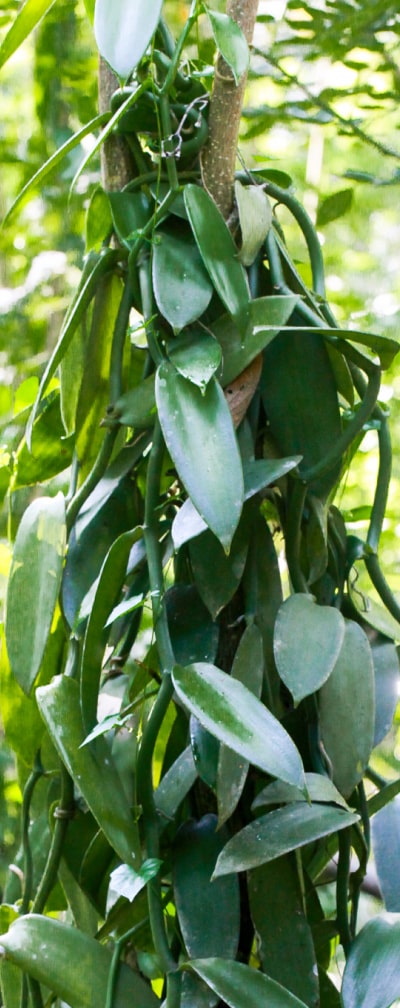
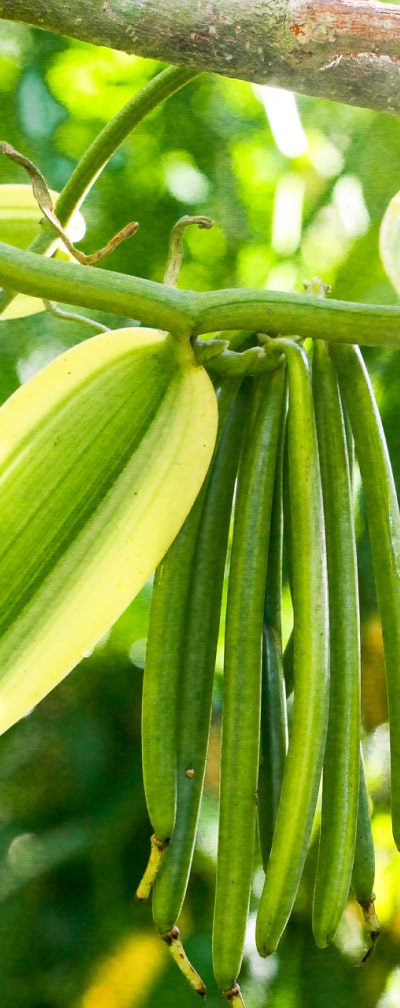
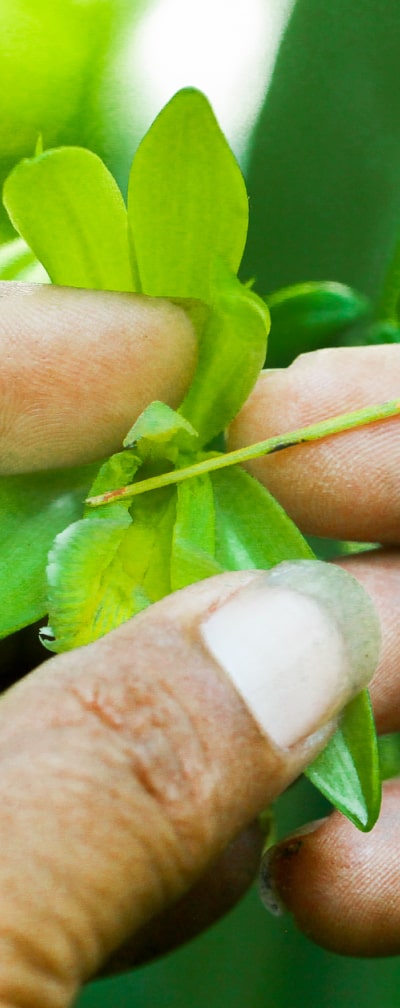
Sustainable Vanilla Journey
Sustainability and Inclusivity: The Necessities
We've implemented sustainable and inclusive practices to ensure hundreds of our farming partners deliver the highest quality raw materials while sustaining the vanilla farm ecosystem
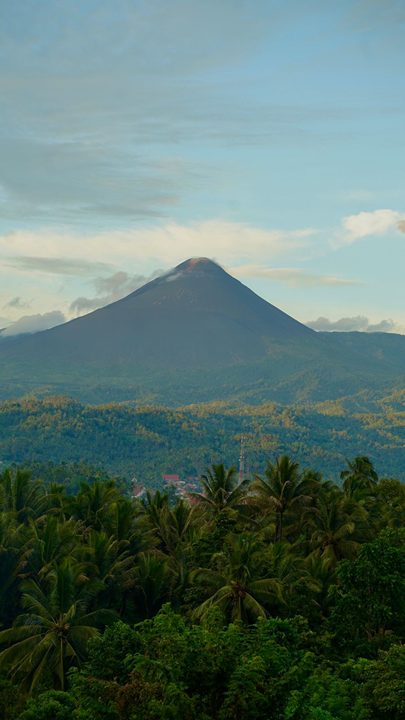
Spice Islands
Spices are a legendary commodity that has attracted many traders around the world. Due to their high value and scarcity, European traders created a maritime route known as the “Spice Route” more than four centuries ago. The final destination on this route is the Indonesian archipelago.
The tropical climate, lush rainforest, very fertile volcanic land, unspoiled farms and unique topography are some of the reasons why spices grow well on most of Indonesia’s islands. At Adore, we have recognized and maximized the potential of Indonesian spices, including vanilla beans, where they have the highest vanillin content compared to other sources in the world. Some of our vanilla beans can even turn into crystallized vanilla beans, which only can be made from vanilla beans with the highest levels of vanillin.
However, relying on these natural advantages alone is not enough to sustain a healthy farming ecosystem; they need to be supported with sustainable practices. Our sustainability program starts with our vanilla plantation, as vanilla is our core product.
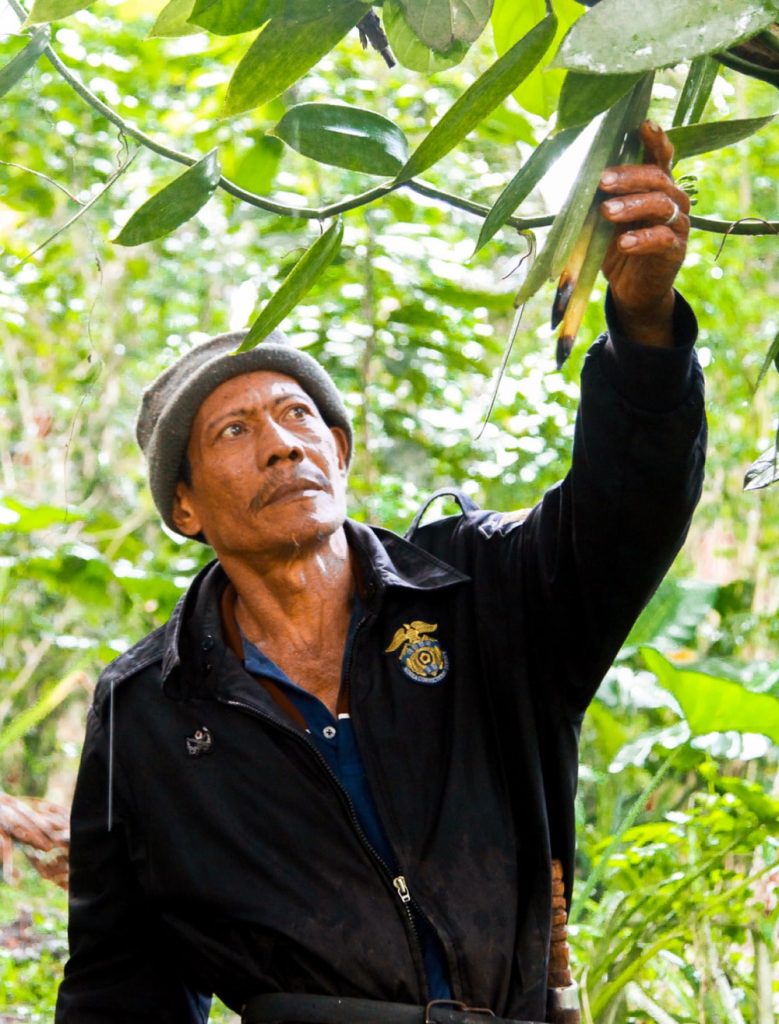
Problems in Vanilla Planting
Our Solution
This bad practice can be avoided by trying to be as close as possible to farmers and putting middlemen and farmers in our extended value chain by promoting an inclusive business model at the farm level. By doing so, we have direct access to educate the farmers and solve the threat of vanilla theft together. Taking care of such labor-intensive crops means we have many chances to apply sustainability practices. We have already implemented these practices step-by-step in hundreds of farms around our factory.
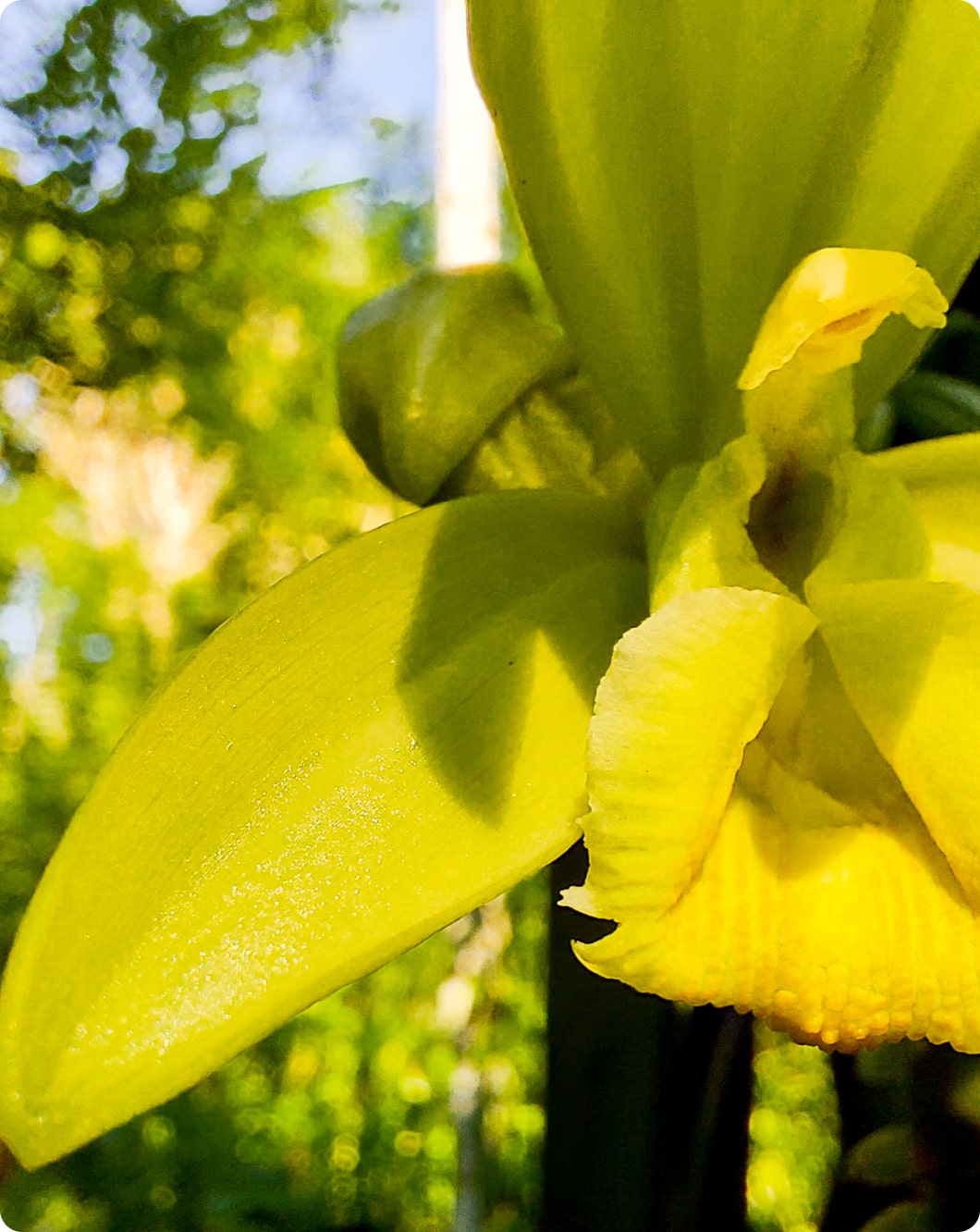
The Vanilla Plant At a Glance.
A naturally Sustainable Orchid.
Not everyone realizes that vanilla is an orchid. It grows on long vines that wind up from its shade trees. Its root grows in mulch around compost to get the nutrition it needs.
Vanilla is an environmentally sustainable orchid that can help capture carbon from the atmosphere. The tree that vanilla grows on captures carbon from the air, and then distributes it to the surrounding root where it is trapped.
Vanilla is mostly planted on the Gliricidia sepium tree, a legume crop that has very good air nitrogen fixation, and therefore plays an important role in protecting and naturally fertilizing the soil while avoiding land erosion. Thus, vanilla plantations provide a potential avenue for forest protection, while also reducing carbon dioxide emissions. Simply put, by running sustainable vanilla plantations, our farmers already contribute to a better world from their farms.
Vanilla takes around three years after it is first planted before it starts to bloom. Each vanilla plant produces several orchids that bloom at different times throughout the growing season and only stay in bloom for one day. Each flower needs to be hand-pollinated to make one vanilla bean.
This process makes growing vanilla incredibly labor-intensive, requiring constant monitoring so that no orchids are missed in the hand-pollination process. Successfully pollinated flowers will produce ready-to-harvest vanilla beans after 9 months. Since the price of vanilla is very high, many farmers stay on their plantations 24/7 during this time of the year to keep their vanilla safe from thieves. The labor intensive process does not stop with farming. Once the vanilla bean is picked at the proper stage of ripeness, it will go through a 6-month curing process to make cured vanilla beans.
From around 6 kilograms of ripe vanilla beans, we can only get around 1 kilogram of cured vanilla beans. A unique vanilla flavor profile is developed during this long process.
As you can see, based on this time-consuming process, it’s no wonder why vanilla has become such a precious spice, one of the most expensive spices in the world.
Sustainability and Inclusion at The Farm Level.
Bringing farmers into our extended value network while improving the sustainability of inheritance farms.
Sustainability at the farm level cannot be separated from inclusion. Dealing with hundreds of farmers with many problems that persist for generations is not a one-day job. We treat vanilla farmers as our clients and put them in our extended value network. We believe that this inclusivity is the key to sustaining the vanilla farming activities in our area. Imparting a sense of belonging for every farmer in the community is very important to get the best quality supplies. Therefore, we have developed an inclusive business model to answer these thorny problems.
We specifically designed our targeted sustainable farming practice guidelines based on real situations we have observed in the field. By including farmers in our extended value chain, we treat our farmers as our suppliers. By doing so, we can improve farmers’ livelihoods and at the same time improve our raw materials.
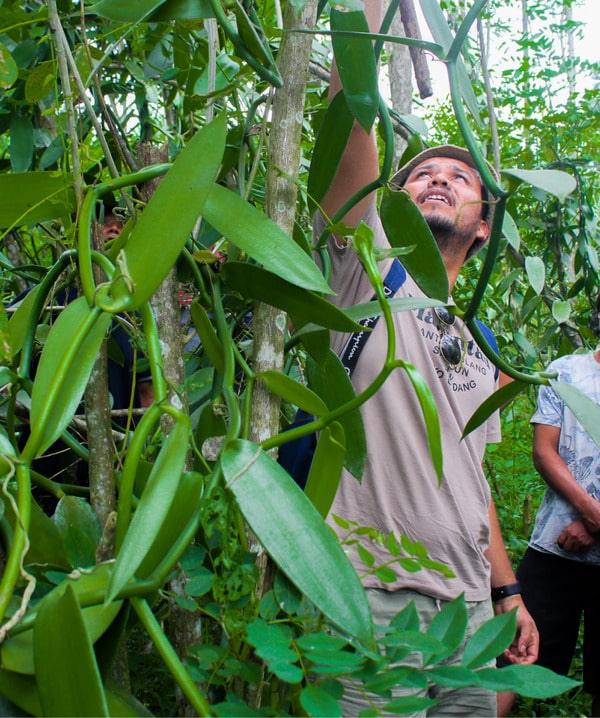
Increasing capacity and income of vanilla farmers through sustainable good farming practice training .
Farmers have their own habits in running their farms since they have been exposed to vanilla farming since their grandparents’ generations. However, we can still easily find practices that are not sustainable. This probably occurs because vanilla farming in Indonesia has experienced a downturn in the last few decades.
Many events make vanilla bean prices go down in Indonesia or even worldwide. One of these events was the increase in the use of chemically synthetic vanillin during the 2000s. This drop in prices hurt vanilla farmers, and a lot of farmers cut down their vanilla trees and replace them with other spices.
Since these decreases in prices kept repeating for different reasons, and because international vanilla trainers did not visit the farms, vanilla farmers never experienced the full process of vanilla farming. Our sustainable good farming practice training focuses on increasing the productive age of vanilla plants and increasing their yield. This training also responds to the specific problems of farmers and provides them with best practices. The goals of this training are crystal clear: to increase the yield of every tree to increase farmers’ income, extend the life span of vanilla trees, and reduce nomadic farming practices to preserve the natural forest.
Initiating and Mentoring Vanilla Farming Communities in Villages.
Threats such as vanilla thieves, losing farming motivation, and other threats can be solved easily by collaboration between farmers. There were no farming communities among the hundreds of vanilla farmers in Southeast Minahasa. We have created several Organic Vanilla farming communities as part of our commitment to sustain vanilla farming among local farmers. These communities can help farmers get more access to many different types of aids, from financial aid to various types of training. we have also keep continued our mentorship efforts in many areas, such as trainings about how to access the wider market, organizations, accounting, and many other needs.
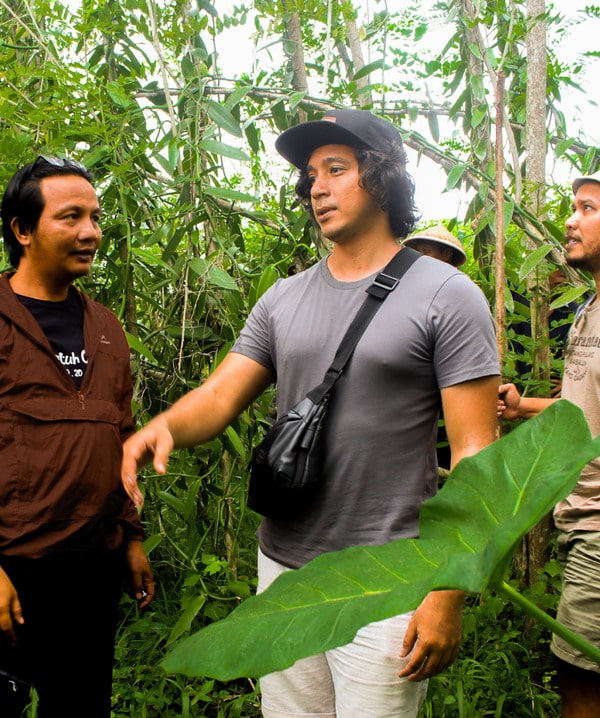
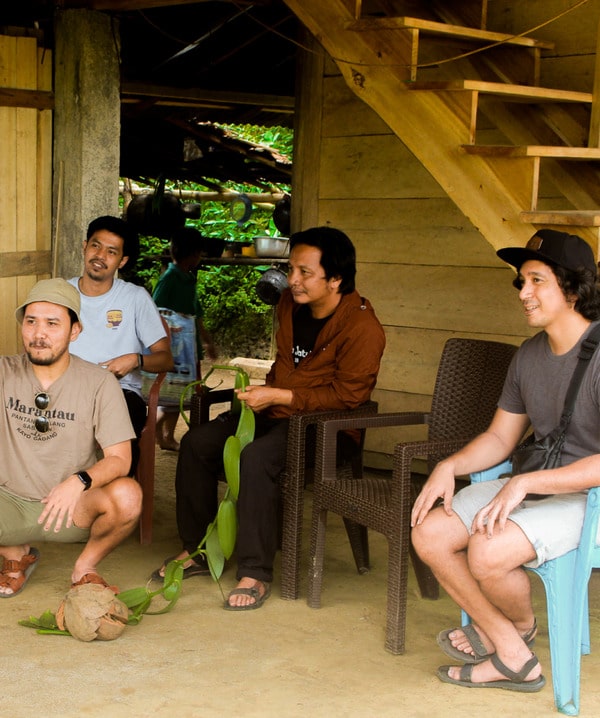
Creating a learning center.
For many farmers, seeing is believing. Therefore we built sustainable demo plots which provide answers to the common problems that exist among local vanilla farmers, where farmers can learn more about organic and sustainable farming practices. This is the nearest learning center for farmers who want to keep up with updated farming techniques.
This learning center also serves as a showcase for many stakeholders who want to learn about sustainable vanilla farming.
Buying reassurance.
Our factory presence in the heart of the vanilla plantation provides reassurance to farmers. They can sell their fresh beans directly to us at much better and more transparent prices.
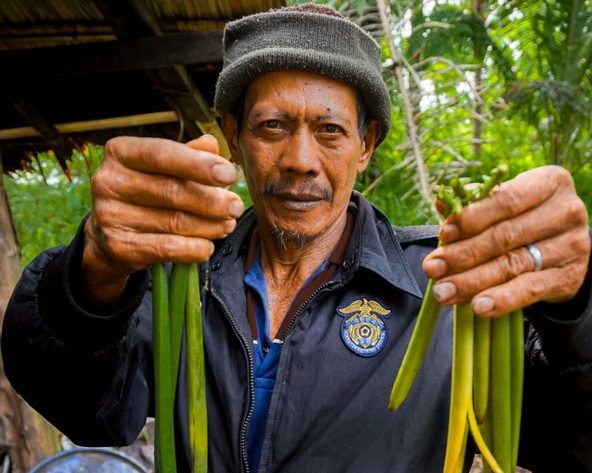
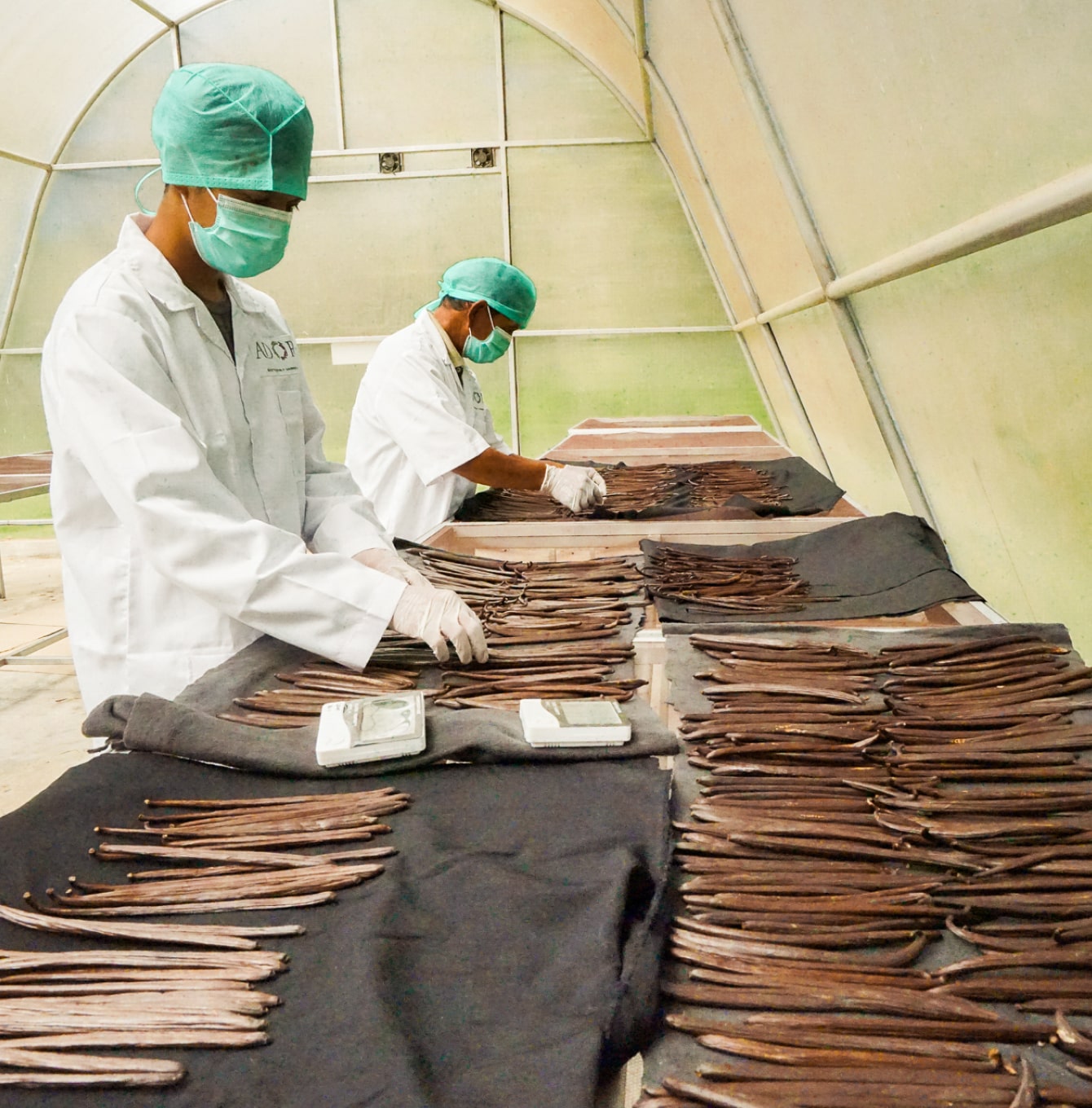
Sustainability On The Production Level.
The traditional curing method of vanilla beans is already environmentally sustainable because the best way to do it is by sun-drying. Even though the energy from the sun is very strong in tropical countries, frequesnt rain can alter this sun-drying process. In this situation, most vanilla processors use an oven to tackle this issue.
However, local middlemen do not use ovens as merely a backup they use them as a first choice since they dry vanilla beans faster. Their priority is quantity, not quality since their bigger middlemen always give them a bean target that they must hit. This practice makes the vanillin content of their vanilla beans drop much lower compared to beans processed with proper curing methods. To keep their operational costs as low as possible, these farmers do not use electricity; instead, they use wood or randomly available biomass.
The smoke generated can not only leave vanilla beans with an undesirable smell, but it also goes into the air and harms the environment. Since Indonesia is the second biggest vanilla producer, this practice in the first processing level contributes to low-quality vanilla beans circulating around the world. This practice can also give the wrong impression about the quality of Indonesian vanilla beans, which can potentially behave the highest vanillin content in the world.
Sometimes using an oven is unavoidable, but we put significant effort into how to minimize its use. We use a solar dryer dome, which can trap heat from the sun for around two times longer than ambient conditions and minimize oven use. This method also reduces the curing process time by 30% while preserving the precious vanillin inside the beans. We keep continually research new production techniques to obtain the most energy-efficient vanilla curing process.
Sustainable Trading Practices.
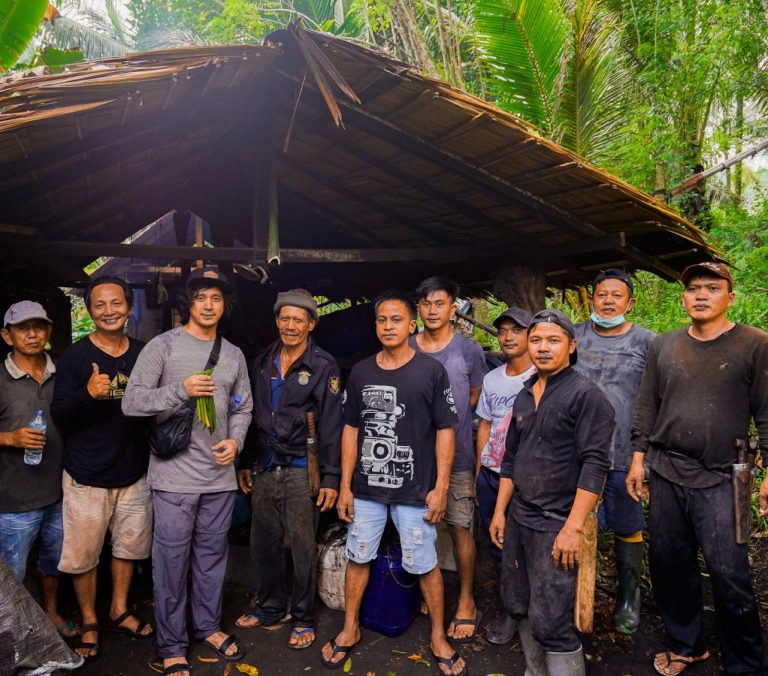
The Future of Trading.
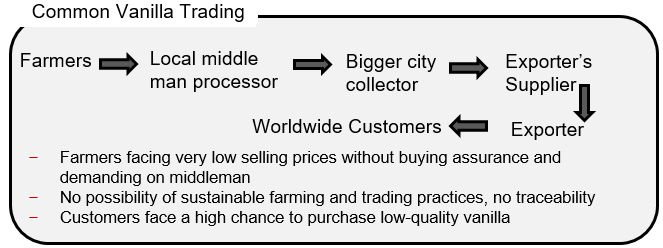
Most vanilla bean suppliers only focus on trading, which consists of a long supply chain and a lot of middlemen. The profits of such a practice are not distributed equally and usually, leave farmers with the smallest portion.
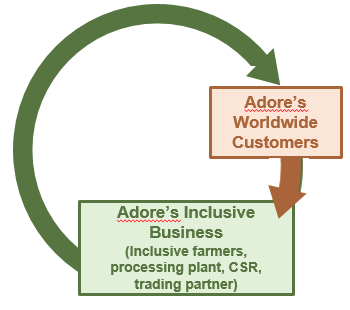
Sustainable trading does not mean eliminating local middlemen with our purchasing power. Instead of creating new problems, we embrace local middlemen as our extended agents with the same value as us. We assign them a new role that benefits everyone in our healthy ecosystem, like an internal controller.
Promoting sustainable trading practices creates the most efficient supply chain possible without exploiting anyone in the ecosystem.
The benefits for our farmers:
- Better buying prices and assurance are offered by us, ensuring fair compensation for their efforts.
- Capacity development initiatives to enhance their skills and knowledge.
- Improved welfare and livelihoods through our inclusive approach.
- Since we focus on traceability, thieves eradication is improving
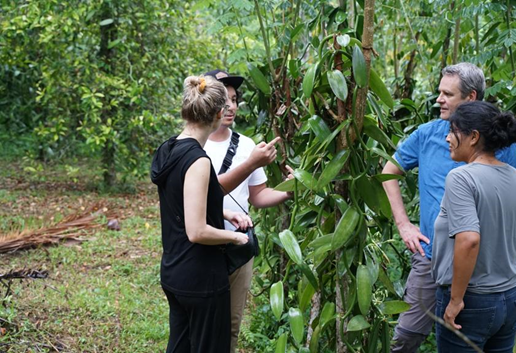
From our customers’ point of view, having us as their suppliers means they have:
- Access to high-quality vanilla beans with exceptional aroma and high vanillin content at competitive prices
- Reliable suppliers, ensuring peace of mind for their business operations.
- Indirectly involved in promoting sustainability in the vanilla ecosystem.
Sustainable Development Goals (SDG)
Sustainability is in our DNA. It is evident in everything from our farmer activities to our finished product. Our business practice is aligned with the United Nations' Sustainable Development Goals. We focus our business on these 3 different goals:

No Poverty
Being the only vanilla supplier in the heart of the vanilla plantation in Indonesia gives us the ability to trade directly with vanilla farmers. We reduce the unnecessarily long supply chain and create an inclusive business.
By doing so, we can increase farmer capacity, provide guidance on how to increase the quality and quantity of the harvest, and have the power to give the best price to farmers, who are usually a part of the value chain of spices trading.
Life On Land
At Adore, we take sustainable farming practices very seriously. We believe that after we take goods from nature, we need to give back in the form of what nature needs to create sustainable agribusiness. We provide an organic farming consultant to make sure our farming activities ensure land sustainability.
We also hired a sustainability consultant to make sure our farmers apply sustainable farming that improves the life cycle and productivity of the crops.
Our sustainable farming practices are a thorough process that aims to preserve the healthy land ecosystem.
Partnerships for the Goals
Our dream of providing the best product while making the world a better place would be very tough if we only did it ourselves. Therefore, we collaborate with many related stakeholders, such as governments, to create vanilla farmer communities where farmers can exchange ideas and practices.
These communities provide benefits for their members such as training, motivation, and access to the market.
We also benefit from this community by having easier access to deliver important training to improve farmers’ skills, which ultimately will align with our missions to bring the best quality sustainable spices to the world.
